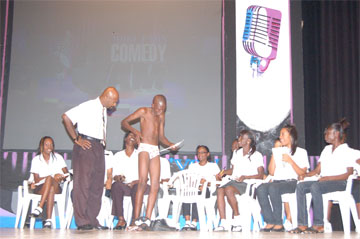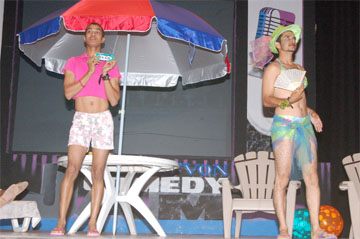Comedy Jam
Not the regular ‘ole ting’
Ron Morrison talks
with Guyana Review about his ‘fresh
perspective” on
stage entertainment
Ron Morrison is animated as much by the social role of theatre as by the art form itself. He locates the essence of theatre in its uniqueness as a medium of communication, “a means by which we can hold up a mirror to ourselves.” For what he is, a hard- nosed businessman, his preoccupation with the essence rather than the economics of the stage is uncommon.
Up until some months ago, Mori J’Von, the apparel company which he owns and manages was better known as the local distributor of the world-famous Hanes apparel. Last week, when we met with Ron in his Robb street office he seemed thoroughly preoccupied with theatre.

Perhaps, though, his is not what one might call a total transformation. There has long been a nexus between Ron’s entrepreneurial pursuits and his predisposition for giving back, through various charitable initiatives. The theatre, it seems, has found him a way to express his own personal perspective on the concept of corporate social responsibility, of giving back both to his clientele and to the society as a whole.
Comedy Jam, Morrison’s recently launched theatre and television production is about what he describes as stress relief. “In a society such as ours we desperately need to find ways of laughing at ourselves. We need to find ways of responding to the pressure. There is the pressure associated with the everyday difficulties that face us as a people. Apart from that we are feeling the pressures associated with the global economic crisis. We simply must find ways of relieving ourselves of that stress. ”
Morrison’s enthusiasm can easily be mistaken for expertise. There is a near breathless enthusiasm, a passion in his soft, deliberate diction. He insists that what he seeks to bring to theatre is a fresh vision informed much more by his own everyday experience than by any profound personal experience in any facet of the art form. In a sense, his is a self-willed rebellion against the conventional wisdoms which he says have both dominated and stunted the art form. His own journey from conceptualization to stage has taken Comedy Jam through a bewildering array of transformations…..engagements and eventual parting of ways with seasoned professionals whose perspectives on theatre, on comedy are altogether inconsistent with his own vision. In the end, he appears to have settled for his own interpretation of what comedy really ought to be and for a team of mostly talented rookies to bring that interpretation to the stage. Comedy Jam, he says, “is about fresh ideas and new perspectives.”

Morrison is not afraid to vent his spleen on local theatre. “On occasions when I have gone to the National Cultural Centre and other venues to watch a local production I have often left in disgust. What I see are productions that seem to me to be designed to do no more than put bread on the tables of the person behind them. What I see is the ghethorisation of Guyanese culture and and everyday life – a Darwinian attitude of survival of the fittest. This should not be accepted or tolerated. Culture, as I understand it, is that medium through which values are transmitted from generation to generation. A people’s consciousness, the way we view ourselves in society, is shaped by our culture. All of the answers are not certain, but the one thing that is clear, is that culture can disable or enable. The time has come for us to decide which option we would embrace.
What Comedy Jam seeks to do is to provide people with an alternative. It is hilarious and entertaining but the underlying message, and the creative effort it seeks to musteris “no joke…”
Morrison talks only briefly about his own “considerable financial investment” in the production, choosing to dwell far more on what he hopes will be “the realization of my vision for transforming theatre.” It is an awesome ambition for a man who readily concedes to being “no expert in theatre.”

Morrison says that the idea of Comedy Jam derives from the energy and excitement created locally by the Jamaican play Bashment Granny. “I paid keen attention to the way in which the production focussed on themes of popular culture to evoke both laughter and sombre reflection.
It was comedy but in as sense its messages were not at all funny. It dealt with real issues and real circumstances; still, local audiences went crazy over it; after Bashment Granny I started to search for a reason why Guyanese always go crazy when overseas productions are brought to Guyana. I thought that there was similar material here in Guyana with which we could work to get the same effect.
It seemed to me that the difference lay in the fact that our own local productions often lack the essence of what it really takes to get people to see the funny side of serious issues in their own lives, to laugh at themselves.”
Comedy Jam seeks to evoke that “laughter at ourselves” while leaving its audiences with something to think about. “Comedy is great, but it has to be carefully thought out. “When, for example, we place the theme of homosexuality on the stage in a degrading manner we evoke laughter but then we do no more than appeal to people’s baser instincts. Homosexuality and some of the other issues that we bring to the stage are serious issues and we have to find ways of treating with them seriously, sensitively, while making people laugh.” Morrison says he hates the banality of the approach to stage comedy that accomplishes nothing but making people laugh. “Comedy Jam wants to do more.
We want to offer lessons that can teach us things about our society and about ourselves and help us to shape responses to what we have learnt.”
His single-mindedness about what he wants Comedy Jam to be has led him eventually to write much of the script himself. His resort to his own writing skills was preceded by what he says were disappointing encounters with better-known talents than his own. “A lot of what I got was re-hashed material, taken from earlier productions with the same twists and slants and nuances. I wanted a fresh approach and I was determined to get it.”
Comedy Jam will hit the stage twice a month, with each production offering new material, fresh themes and different ways of viewing everyday life. “I like the idea of creating a forum that allows for people to relax without the loudness of the popular music. There are so many wonderful ways in which we can humour ourselves. There are so many things about ourselves that we can laugh about.”
Morrison advocates a theatre season in Guyana. “One of the weaknesses of our theatre is that there is no consistent season. People simply do shows randomly. What I find is that the randomness sometimes results in sub-standard productions, the same repetitive approach. I think, frankly, that people are fed up with that approach to theatre. If what is being offered is not an overseas production many people are not inclined to go to the theatre. They tend to dismiss what we offer locally as the regular old thing.”
Morrison says, that Comedy Jam “is here to stay.” It is a bold perhaps even reckless assertion, in an industry that is fraught with inconsistency. He believes, however, that his new production has already made a promising start. “We have already established a season. It began on November 9 and we want that season to last for six months. We had a preview prior to the start of the production which was followed by a premier on November 25. We had a subsequent hold-over on November 27 and there will be yet another on December 18. “Once I remain at the helm I will ensure that we bring fresh, new ideas to the table. We will keep getting better and better.”
Comedy Jam is also destined for television with the production being divided into separate programmes. Ron is currently scrutinizing the footage shot from stage with a critical eye. As yet he is not certain that what he has is quite ready for television. “I want to get it right. If we have to do this all over again I want to get it right. One of the things that I have promised myself is that this will not be a question of simply going with what we have. That approach will not work if you are genuinely seeking change,” Morrison says. What energizes him, he says, are the responses that Comedy Jam has evoked. “Our responses from people who have seen the show have been encouraging. I have been most heartened by the responses of people who have told me that Comedy Jam is different. That difference is what we are looking for.”
What inspires Ron Morrison? What is it that has drawn him to the theatre He waxes poetical, “I believe I am inspired by the artist the lies in all of us; that sense of character, that soul that learns from the past; that spirit that anticipates the future; that mind that is alive, on fire with creativity and that heart that knows no bounds.”
Not the regular ‘ole ting’
